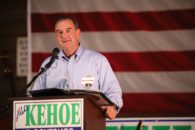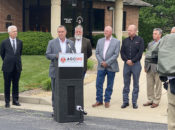Missouri has been the backdrop for several of the nation’s leading political figures, from Jack Oliver to Joyce Aboussie to Jeff Roe, and in 2016, Missouri became a big part of the story of a new rising star in national politics: Austin Chambers.
Chambers managed the campaign of Gov.-elect Eric Greitens, and is now serving as the Gov.-elect’s senior advisor during his transition. He is someone who is being widely talked about in the Capitol, but the Georgia native is someone few Missourians personally know.
At first blush, it appears odd to associate the title senior anything to someone who just turned 21, but one way to distinguish people who know Chambers from people who only know of him is that no one we spoke to who has worked with him referenced his age.
However, his Twitter bio takes his age head-on, quoting the book of 1st Timothy: “Let no man despise thy youth; but be thou an example…”
It seems a fitting metaphor for the direct take-no-prisoners approach Chambers has taken to his career in politics, and now government.
Those who have worked for him have raved about his political horse sense and work ethic during the campaign, even using words like “savant.” However, since the transition began, some of the government types who have worked with him have been taken aback by the 7 a.m. to midnight work schedule he has set during the transition.
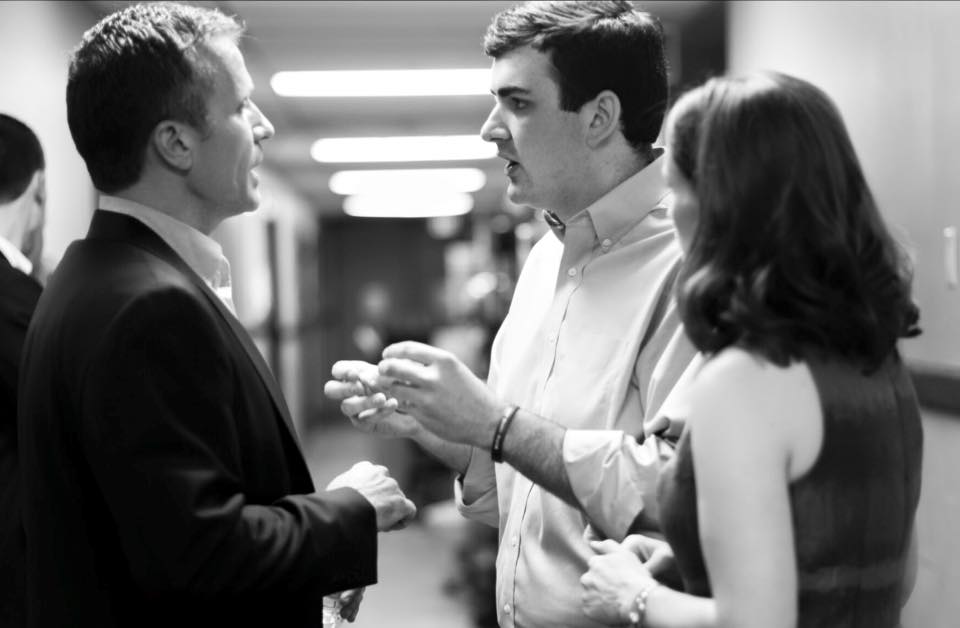
As Missourians get to know the man at the top of the Greitens administration, there is a lot to look back on his career leading up to entering government next month.
THE PERDUE CREW
Chambers was working in Republican politics long before graduating high school. A native of Georgia, you can tell from the Atlanta Braves cap he regularly sports, who later moved to Virginia as a child he volunteered for his first campaign at age 12.
He would have his first job on a campaign at 14, and by 17, he was managing his first campaign where he met the person who is closest to in politics, Paul Bennecke. The two have since become so close that Chambers is sometimes referred to as Bennecke’s clone.

Chambers was so immersed in politics by high school that he had the symbol of the Grand Old Party on the cake to celebrate his graduation. During that time he was already working to help elect Republicans in Virginia.
It wasn’t long before some of the connections he had made not only brought him home to Georgia, but set him up for a big promotion. Bennecke – who would later play a key role in the Greitens campaign effort as the executive director of the Republican Governor’s Association – was a top advisor to former Georgia Governor Sonny Perdue.
In 2013 Bennecke was taking on a leading role the Governor’s cousin David Perdue’s U.S. Senate campaign. He recruited Chambers back to Georgia to serve as the political director for the campaign.
Sen. Perdue told the Missouri Times Chambers was a critical part of his campaign.
“Austin’s leadership was critical to our 2014 US Senate campaign in Georgia,” Perdue commented. “He was tireless in building and executing a grassroots effort that defied national polls and the political establishment, resulting in a decisive margin of victory on Election Day.”
Under Bennecke, Chambers rose to a leading role in the campaign and earned a place alongside a group of rising Republican political stars out of Georgia connected to the Perdue family’s campaigns. Perdue’s team included now-top national GOP strategist Nick Ayers, who managed an outside group that spent money in the Greitens race, but a relative of the Perdue family closely observed the contest and recognized Chambers’ rise.
If you look closely you can see some of the tactics Chambers perfected with the Greitens campaign in 2016 exhibited during the Perdue campaign two years earlier.
The 2014 Georgia U.S. Senate campaign had a strikingly similar political landscape as the Missouri Governor’s race in 2016. There was to be a primary with well-funded and well-known Republicans battling it out to face a well-funded and well-known Democrat. In 2014 Georgia, the Democrat was Michelle Nunn.
Missouri is a red state trending deeper red while Georgia is red state that some see as trending purple. Regardless, many felt that Nunn, the daughter of former moderate Democrat Senator Sam Nunn, had the ability to carry the red state just as Missouri Attorney General Chris Koster was favored to win Missouri’s Governor’s race as a Democrat in increasingly red Missouri. And both Perdue and Greitens started their campaigns as underdogs in crowded primaries.
While Perdue began the campaign sharing the last name of the former Governor of Georgia, he was relatively unknown to Georgia Republicans. Greitens started off as an even bigger underdog without the name identification Perdue would enjoy. Perdue cast himself as the outsider against his chief opponent, the well-funded Congressman Jack Kingston, who the Perdue campaign would cast as a Washington insider.
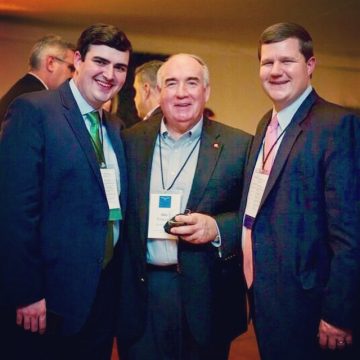
Two years later, Greitens cast himself as the outsider in Missouri against the Jefferson City insiders – former House Speaker Catherine Hanaway and Lt. Gov. Peter Kinder.
The crew of Georgians led both Perdue and Greitens to wins both outspending their opponents and both riding outsider messages to primary victories. Perdue went onto defeat Kingston in the primary runoff, while Greitens comfortably won his 4-way primary with 34% of the vote two years later.
In the general election Perdue won 52% to 45% while Greitens won 51% to 45%.
However, looking at their races the similarities don’t begin with the political situations and end with the results. The two campaigns heavily utilized social media to build momentum, they both were designed to peak at the right time and trumpeted polling that showed their campaigns taking leads in the final weeks.
Furthermore, both campaigns would revolutionize fundraising and the use of data in their states.
“Austin Chambers deserves a ton of credit for orchestrating masterful primary and general election campaigns – tough opposition in both and a volatile political environment. He did a great job,” said House Speaker Todd Richardson.
After the Perdue campaign, Bennecke would go on to follow in Ayers footsteps as executive director of the Republican Governors Association (RGA), Ayers’ firm, Target Strategies, was the largest vendor in the Perdue race would rise in size and prestige. Ayers himself has been proposed by many to head the Republican National Committee (RNC) last month, and Chambers would decide he wanted to follow in his two mentors footsteps by winning governors races, which would eventually bring all three of them to the Show Me State.
GREITENS FOR MISSOURI
Eric Greitens was a dynamic figure out of the gate in Missouri politics. People instantly formed passionate opinions about him both pro and con. However, it was clear from his biography to his fundraising ability to his communication skills that Greitens was a lightning rod.
Ayers connected with Greitens early in the cycle and signed on as his general consultant. As far as governor’s races were concerned his firm would spend the 2016 cycle primarily focused on Missouri and Indiana working on then-Governor Mike Pence’s re-election. This was after winning the Illinois gubernatorial race in 2014 with now-Gov. Bruce Rauner.
Coming out of the Perdue campaign, Chambers decided that he wanted to work on electing Republicans in races for governor.
“Lets just say that Austin is very, very persistent,” Ayers said seemly searching for the proper word to describe Chamber’s aggressiveness. “On the third or fourth visit to our office we hired him, and it was great for us that we did.”
Working for Ayers, Chambers began the cycle writing the grassroots plan for Gov. Pence’s re-election.

“The grassroots plan really got everyone’s attention,” Chambers said. “It was outstanding and exactly what the Governor needed.”
However, things weren’t as rosy for Ayers client in Missouri. It was clear to everyone watching that the Greitens campaign was struggling with staff issues.
Some observers began speculating that the Greitens campaign had the potential to devolve into a better funded, but poorly organized effort like Missouri has seen from several previous first-time candidates.
It was in August of 2015 when Chambers moved his focus from Indiana to Missouri in what was supposed to be a temporary assignment.
“I don’t think it’s any secret that we had some issues early on. We sent Austin to help stabilize the race and organize the campaign,” Ayers said. “Initially, we sent Austin to the campaign for three or four weeks. Then that became three or four months. By that time he had really clicked with the Eric and Sheena and had done such great job turning things around that it became obvious that he was the guy to lead the campaign.”
People who have worked with Chambers recite a mantra used in the campaign the two most important things in a campaign are fundraising and messaging.
There was never any question that Greitens would be able to raise the money, and it became increasingly clear that Chambers was locking down the message. His was the name on most press releases and he did most of the speaking to the media himself, nearly always on message.
Ultimately, Ayers and Greitens approached Chambers about being the campaign manager.
“He did a ton of work on the race, but he didn’t ask to be campaign manager. Eric and I sat down with him and asked him to take on the role,” Ayers said.
While Ayers knew Chambers well, it’s still surprising to see a 20-year-old asked to run a campaign the size of the Greitens’. When asked Ayers said it wasn’t a factor.
“He was always, even in tough stretches, very calm in the pocket,” said Ayers, who was tapped to run the RGA at 23. “Austin’s age wasn’t a factor at all. The thought never even crossed my mind.”
However, after Chambers came on board, there was immediately a different tone to the campaign. He changed several staff positions and immediately implemented data goals. While Greitens was relentlessly on message, the changes in the campaign created opportunities to allow him to better feature his communication skills. The campaign also settled on Victory Enterprises – one of the hottest Republican firms in the state as their in state consultants – and was off to the races.
David Steelman, who – along with his wife, former State Treasurer Sarah Steelman – was one of Greitens early prominent supporters in the state remembers his first conversation with Chambers.
“I was in a field near our house when Austin called and we talked for a long time about the issues the campaign was facing,” Steelman said. “The conversation lasted long enough that by the time I got off the phone, I was back to the house and I remember immediately looking at Sarah and telling her that I think this is the guy – Eric needs to win this thing.”
As the campaign unfolded, Greitens proved to be the most successful fundraiser in Missouri history, and proved he would literally travel anywhere in the state at any time. Jason Crowell, former state senator, tells a story that, very early on in the campaign, he met Greitens at an event in Cape Girardeau where he was one of only six people in attendance.
Chambers laid out the narrative that Greitens was an outsider Navy SEAL and his opponents were merely Jefferson City insiders every day on social media and in the press. It was a fine-tuned version of what Perdue did to Kingston two years earlier in Georgia.
“When you have a once-in-a-lifetime candidate like Eric Greitens, it can be tough to build a team around him that operates at the same level. Austin was the missing piece,” said Jeff Layman, the campaign’s finance chairman and one of Greitens earliest supporters. “When he joined the team, things clicked immediately. He is relentless, decisive and brilliant. He doesn’t blink and he’s not afraid to turn the ship at a moment’s notice. It was fun to watch him navigate the campaign against four very tough opponents.”
Many political observers thought despite the fundraising advantage Greitens had amassed, an unknown defeating three established names in Missouri politics was impossible. However, none of the three attacked Greitens before he went up on television in mid-June.
“We knew we couldn’t be in first because the other three would have attacked us,” Ayers said. “To win we had to peak at the right time, and we did. It was a risky strategy that Austin immediately bought into and implemented.”
When Greitens did go up on television, he proved that his campaign understood the temperament of Missourians better than anyone else. The infamous ad where Greitens was firing large guns to symbolically blow up government was ruthlessly attacked by the media and even some Republicans, but it proved to be exactly the mood of Missouri voters. Some observed that it might have been the best political ad since Claire McCaskill assisted Todd Akin in the 2012 U.S. Senate primary.
The campaign also peaked at the right time.
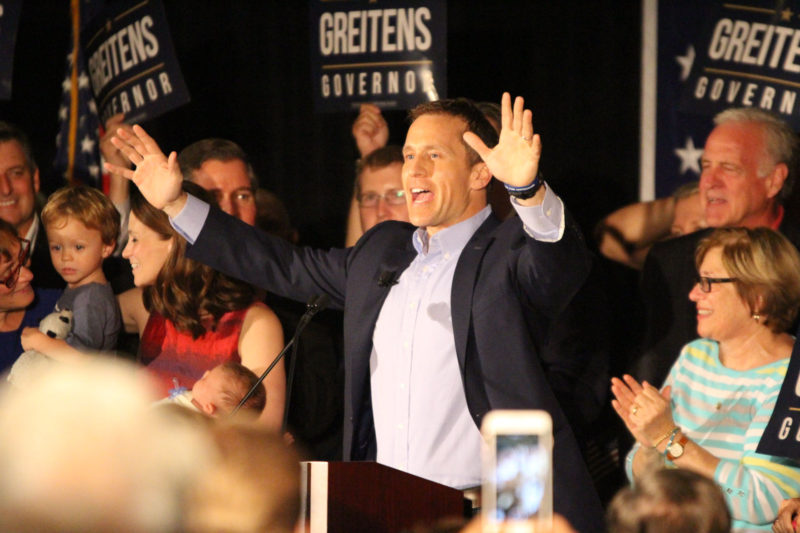
After Greitens made it through unscathed until he was up on television, it became clear that he was the likely winner. In fact, the pro-Greitens LG PAC – ambiguously named to appear as pro-Kinder – was attacking Brunner and Hanaway before Greitens began being hit by Brunner.
The final weekend of the primary, national Democrats realized Greitens was the likely winner and began attempting to attack him in the August primary. But in a foreshadowing of what was to come in the fall, Chambers took every opportunity to hang Washington Democrats around the neck of Koster, and the attacks against Greitens were unsuccessful with Greitens winning the primary by a surprising margin.
SWEEP
In the general election, Democrats attempted to use the gun ad to attack Greitens, and Chambers responded by doubling down. Again he seemed to know the 2016 Missouri electorate better than his opponents.
In doing so they garnered the respect of the Missouri political community.
“Austin Chambers and the Greitens team ran one of the best campaigns we have seen in Missouri,” said Jeff Roe. “Their discipline in waiting for a late surge on the right data-driven messages paid off. Austin and the governor-elect both have a bright future.”
The general election would prove in some ways more challenging than the primary as Koster was widely acknowledged as one of the state’s most talented politicians. After losing the NRA endorsement to Koster and then a poor performance at the Farm Bureau meeting saw the largest agricultural group endorsing Koster as well, the Greitens campaign would find themselves down as much as 14% in some polls.
After trying a few different lines of attack. Chambers finalized a narrative that Greitens would repeat over and over in the general election – that Koster was a “corrupt career politician” – and just as he had done in Georgia, hung the unpopularity of national Democrats around his opponent’s neck.
The relentlessly aggressive strategy earned Chambers some detractors, but also clearly got under the skin of Greitens’ opponents. One Democratic operative on the condition of anonymity said, “Coming from outside the state, he was easy to get riled up at and focus a personal animosity on him and forget that we should be firing at Greitens.”
When half a million dollars was set aside for Democratic turnout efforts in the inner cities, Chambers shot out a release that the toxically unpopular Hillary Clinton had given Chris Koster half a million dollars. However, perhaps more impactfully when one of the most unpopular figures in Missouri political history – Barack Obama – did a radio ad in support of Koster, Chambers quickly sent the ad with Obama’s voice as a robocall to tens of thousands of rural Missourians who detested the president.
Expounding on what the Perdue campaign had done, Greitens took social media to another level, constantly using photos of events to highlight momentum in the campaign and message against Koster.
While Chambers was able to build relationships with several Republican leaders to bring them into the Greitens’ camp after the primary, he proved he could throw elbows as well.
When a person in a Greitens television ad had written insensitive social media postings Chambers tersely responded to the Post-Dispatch: “Robert Murphy fought for the media’s right to write dumb gotcha stories.”
Later, when a Missouri Times/Remington Research poll showed Greitens down double digits in September, he told the Springfield News-Leader that he put “zero stock” in the polling.
“I was stunned over and over by Austin’s ability to have his finger on the pulse of Missourians from almost the day he took over the campaign. I know data had a lot to do with hit, but he was constantly calling people to get a sense of the landscape as well. It was a great campaign that spoke to the state,” said Rep. Rocky Miller, R-Lake Ozark.
During the home stretch of the campaign, you could see Chambers’ Perdue connections coming to surface in Missouri. Both Senator Perdue and then-Vice Presidential nominee Mike Pence campaigned alongside Greitens in the state, and the Bennecke-led RGA contributed millions to the race.
In the end, the electorate that Chambers has been messaging to from day one showed up and gave Donald Trump a 19 point victory in Missouri and Greitens a surprising 5 point win.

SUBMITTED
Jack Oliver, perhaps the most successful political professional in Missouri, was clearly won over by Chambers during the campaign, telling the Missouri Times: “In over 25 years of being engaged at state and national politics, I have rarely seen someone of Austin’s talents at any age. To have achieved so much at his age is a rare feat, and our governor-elect and our state are fortunate that we have him! Under his leadership, he led the effort to achieve something most people thought impossible”
After one of the best election nights for the GOP in decades, Bennecke and Ayers are now established national Republican party leaders, and their fellow Perdue alumni are leading the transition of only the second Republican governor elected in Missouri since the 1980s.
It appears that after the win, Chambers will be sticking around the Show-Me state for a while. When asked what Missourians should know about the rising star that they played a role in making Ayers was long on praise.
“Missourians should know first that he is honest, and chiefly motivated by good policy. He will be extremely loyal to the Governor-elect, and they can count on him working tirelessly to keep the promises that were made during the campaign.”
Rachael Herndon was the editor at The Missouri Times and also produced This Week in Missouri Politics, published Missouri Times Magazine, and co-hosted the #MoLeg podcast. She joined The Missouri Times in 2014, returning to political reporting after working as a campaign and legislative staffer.
Rachael studied at the University of Missouri – Columbia. She lives in Jefferson City with her husband, Brandon, and their two children.









